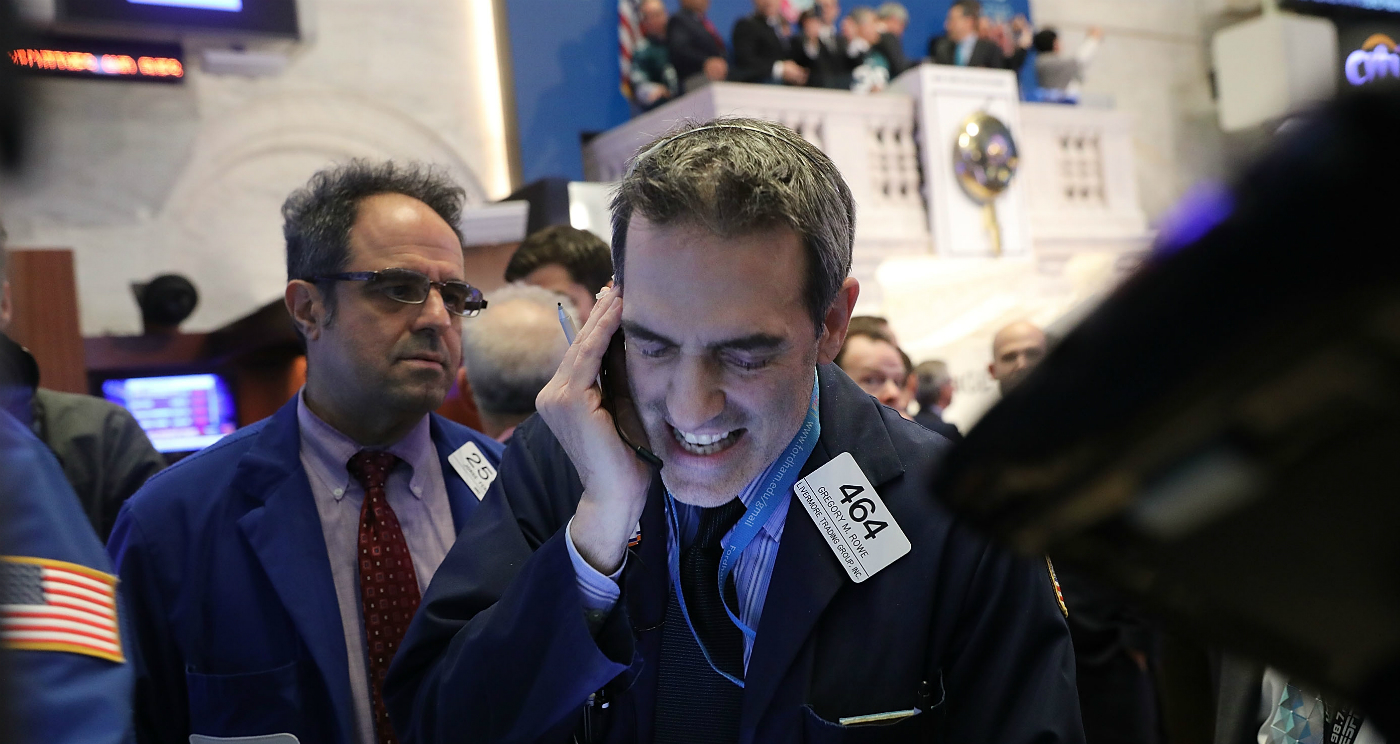Why global markets are in ‘free fall’
European stock exchanges follow Dow Jones south with worst drop since Brexit vote

A free daily email with the biggest news stories of the day – and the best features from TheWeek.com
You are now subscribed
Your newsletter sign-up was successful
European stock markets reeling from an overnight sell-off in the US and Asia were heading for the worst drop since the Brexit referendum this morning, jolted by investor fears about interest rates and government bond yields.
As the Dow Jones gloom spread, the Stoxx Europe 600 index fell 3% in early trading in London, with “every sector in the red”, CNBC says. London’s FTSE 100 lost 3.5%, “with every constituent falling and financial stocks hit hardest at the sector level”, reports the Financial Times.
The drops come after Wall Street suffered its worst percentage fall since August 2011: the Dow finished 4.6%, or 1,175 points, lower on Monday. The rout then swept across Asia, with Hong Kong’s Hang Seng Index down 4.2% and Japan’s Nikkei slumping 4.7%.
The Week
Escape your echo chamber. Get the facts behind the news, plus analysis from multiple perspectives.

Sign up for The Week's Free Newsletters
From our morning news briefing to a weekly Good News Newsletter, get the best of The Week delivered directly to your inbox.
From our morning news briefing to a weekly Good News Newsletter, get the best of The Week delivered directly to your inbox.
Analysts scrambled to explain the global losses.
Reuters says the “trigger” was US data released on Friday that showed wages rising at the fastest rate since 2009, with an annual increase of 2.9%, sparking worries about inflation and higher interest rates and leading to a sharp rise in US bond yields.
But according to Bloomberg, multiple factors are to blame. “As with plane crashes, the experts are pointing to a confluence of factors, from concerns over the path of Federal Reserve interest rate increases to a rapid unwinding of trades predicated on continued low volatility in markets,” says the website.
CNBC argues that while “no particular piece of news” may have pushed major US indexes into the red, shifts in the bond market created “volatility and concern” that inflation might kick in faster than expected.
A free daily email with the biggest news stories of the day – and the best features from TheWeek.com
Economists and analysts have been warning for weeks that inflation levels in major economies could increase beyond the 2% to 3% that central banks believe is good for developed countries, The Guardian reports.
Australia’s ABC News takes the long view about why markets are in “free fall”, blaming American investors who boosted Wall Street to record levels - aided by the US Federal Reserve, which cut interest rates to zero and pumped more than $3trn into the economy. Much of the extra cash floating around flooded into bond and stock markets, inflating values and and distorting returns.
“The party had to come to an end at some stage, and it appears that happened last week,” the website concludes.
-
 Political cartoons for February 20
Political cartoons for February 20Cartoons Friday’s political cartoons include just the ice, winter games, and more
-
 Sepsis ‘breakthrough’: the world’s first targeted treatment?
Sepsis ‘breakthrough’: the world’s first targeted treatment?The Explainer New drug could reverse effects of sepsis, rather than trying to treat infection with antibiotics
-
 James Van Der Beek obituary: fresh-faced Dawson’s Creek star
James Van Der Beek obituary: fresh-faced Dawson’s Creek starIn The Spotlight Van Der Beek fronted one of the most successful teen dramas of the 90s – but his Dawson fame proved a double-edged sword
-
 Epstein files topple law CEO, roil UK government
Epstein files topple law CEO, roil UK governmentSpeed Read Peter Mandelson, Britain’s former ambassador to the US, is caught up in the scandal
-
 Iran and US prepare to meet after skirmishes
Iran and US prepare to meet after skirmishesSpeed Read The incident comes amid heightened tensions in the Middle East
-
 Israel retrieves final hostage’s body from Gaza
Israel retrieves final hostage’s body from GazaSpeed Read The 24-year-old police officer was killed during the initial Hamas attack
-
 China’s Xi targets top general in growing purge
China’s Xi targets top general in growing purgeSpeed Read Zhang Youxia is being investigated over ‘grave violations’ of the law
-
 Panama and Canada are negotiating over a crucial copper mine
Panama and Canada are negotiating over a crucial copper mineIn the Spotlight Panama is set to make a final decision on the mine this summer
-
 Why Greenland’s natural resources are nearly impossible to mine
Why Greenland’s natural resources are nearly impossible to mineThe Explainer The country’s natural landscape makes the task extremely difficult
-
 Iran cuts internet as protests escalate
Iran cuts internet as protests escalateSpeed Reada Government buildings across the country have been set on fire
-
 US nabs ‘shadow’ tanker claimed by Russia
US nabs ‘shadow’ tanker claimed by RussiaSpeed Read The ship was one of two vessels seized by the US military